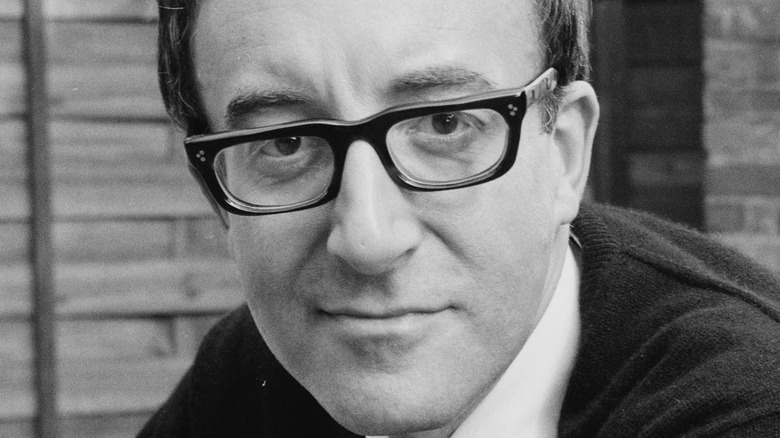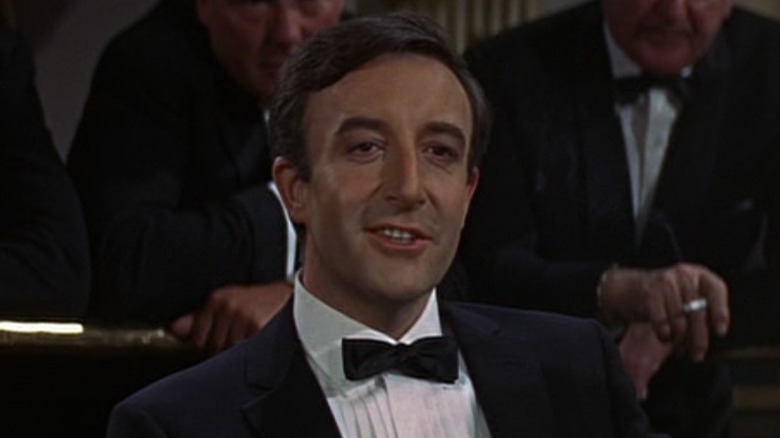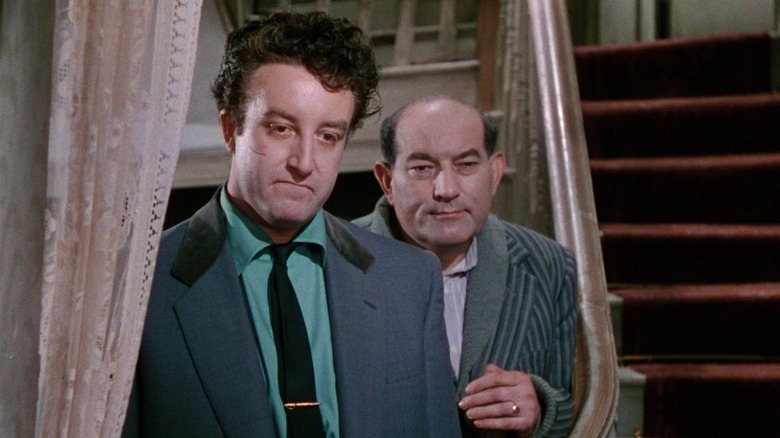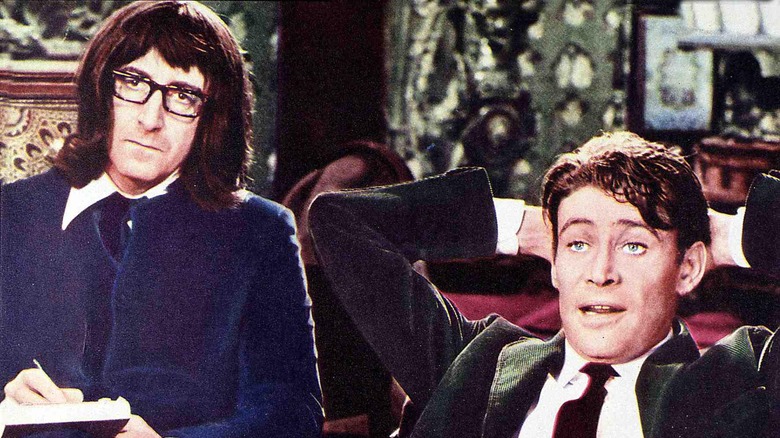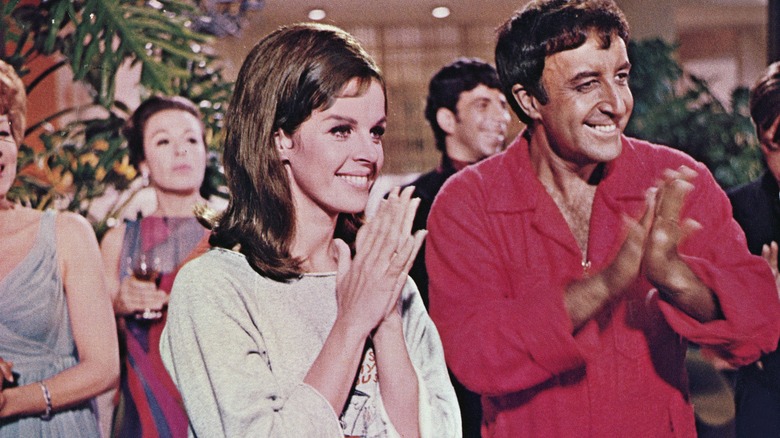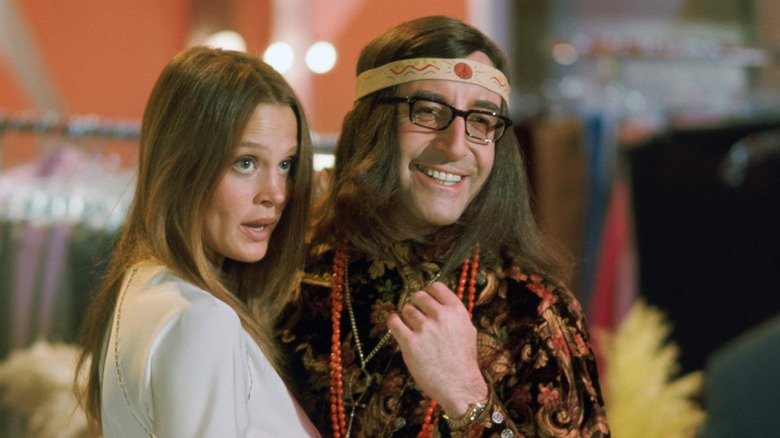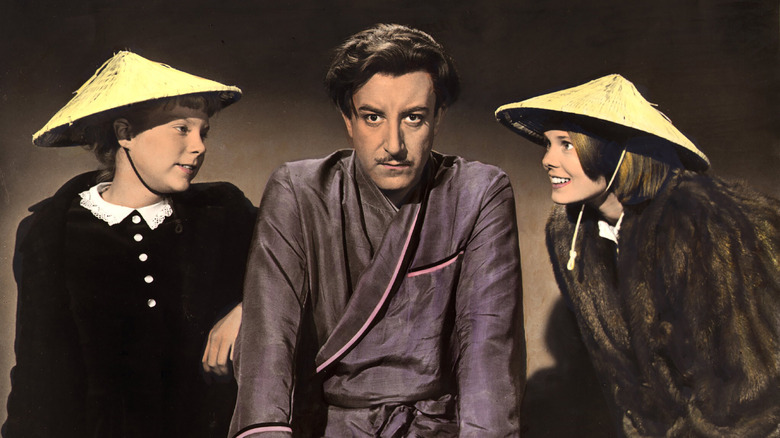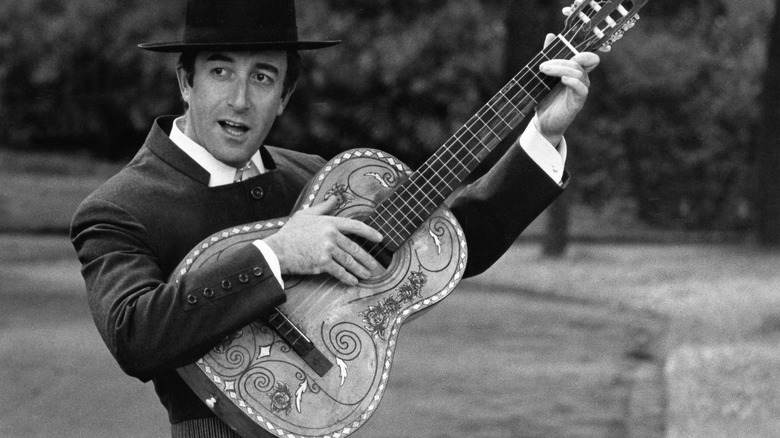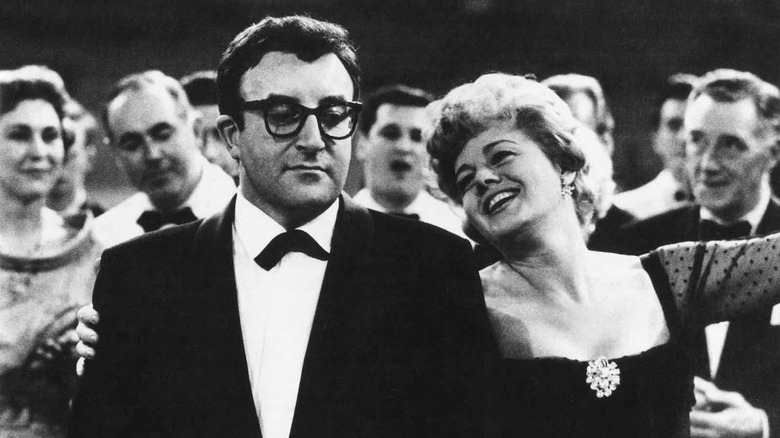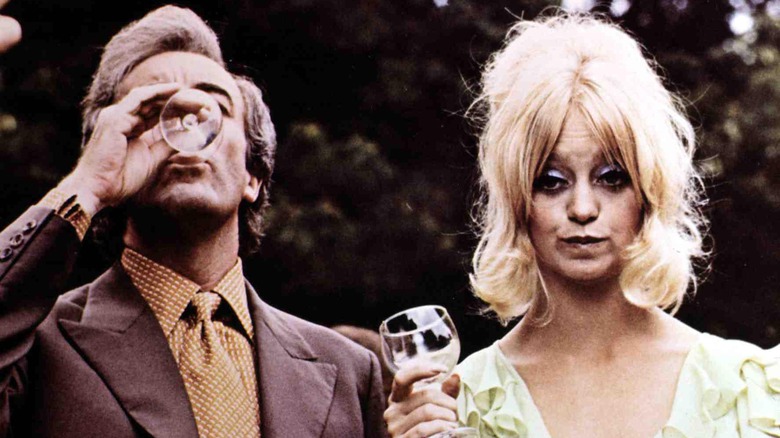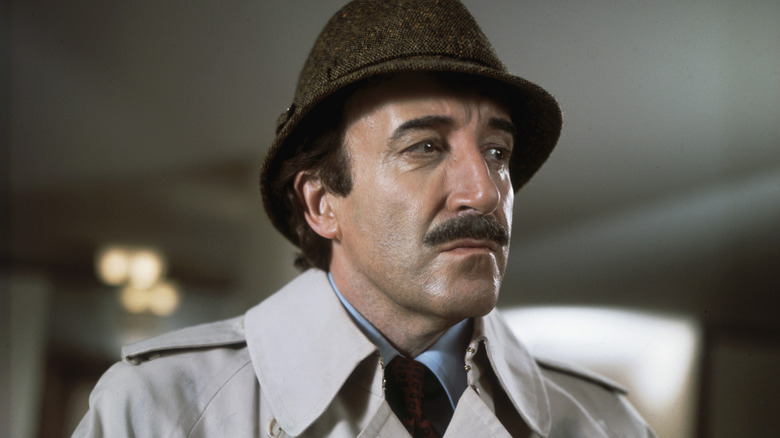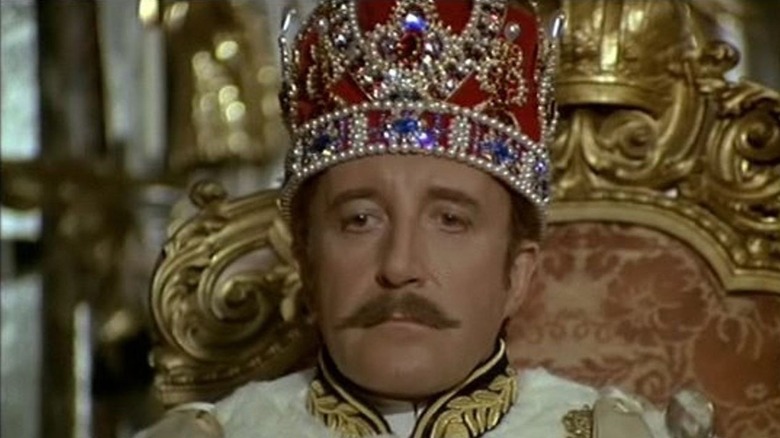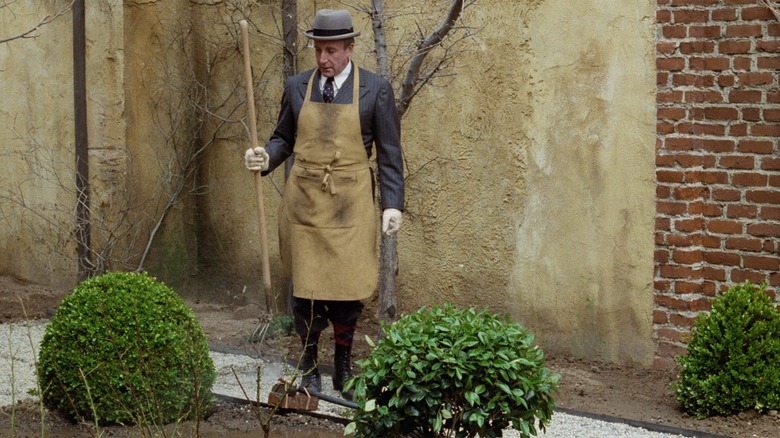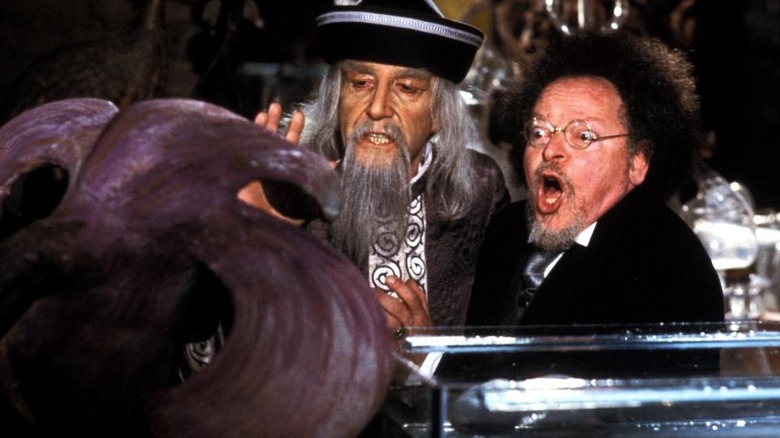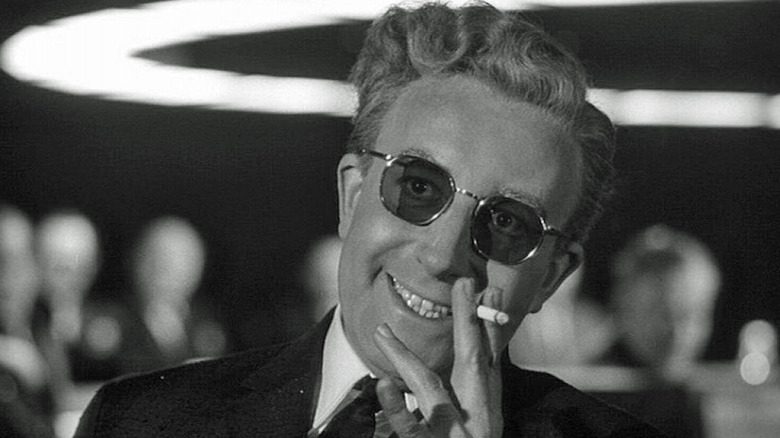The 7 Best And 7 Worst Peter Sellers Movies Ranked
The true story of Peter Sellers was so famously chaotic that it inspired a bestselling book and TV movie, both titled "The Life and Death of Peter Sellers." Notoriously volatile and enigmatic, he once reportedly told Roger Ebert that he had "absolutely no personality at all. I am a chameleon. When I am not playing a role, I am nobody." That probably explains why so many of his best films were built around his ability to completely transform into a character, often through elaborate makeup and distinctive voices.
Born in 1925 in Portsmouth, England, Sellers' career began on the English radio program "The Goon Show" and the short film "The Running Jumping & Standing Still Film," which brought him an Oscar nomination. When he moved into acting, he displayed a talent for comedy and slapstick, often based around a broadly sketched character. His most famous creation was perhaps the bumbling French policeman Inspector Clouseau from the "Pink Panther" series, who he played five times.
Sellers often played multiple characters in the same film, and he had a chameleon-like talent for disappearing into a role without the use of prosthetics. He stayed busy until his untimely death in 1980 from a heart attack at the age of 54.
Let's take a look back at Peter Sellers' seven best and seven worst films, ranked.
Worst: Casino Royale (1967)
Roger Ebert called "Casino Royale," "a definitive example of what can happen when everybody on a film goes simultaneously berserk." He wasn't the only critic to pan this James Bond spoof, which had a famously haphazard production. Producer Charles K. Feldman purchased the rights to Ian Fleming's first 007 novel a decade before "Dr. No" was released. Unable to land Sean Connery, he decided instead to employ several actors to play various comedic versions of the famous spy, including Peter Sellers. He also hired five different directors, all of whom "were given instructions... only for their own segments," Ebert explained, which was "painfully obvious."
The plot finds the original Bond (David Niven) coming out of retirement when a mysterious organization starts knocking off British secret agents. Sellers plays one of the duplicate Bonds, aka Evelyn Temple, an expert gambler recruited to face off in a baccarat game against the evil Le Chiffre (Orson Welles). Among the various other 007s are former Bond girl Ursula Andress ("Dr. No") as Vesper Lynd and Woody Allen as Bond's nephew, Jimmy Bond.
Ebert's write-up was particularly harsh on Sellers, who prior to this "was the funniest comedian in the movies," but here was "simply self-infatuated and wearisome." Contemporary assessment of "Casino Royale" hasn't been much kinder, with Peter Debruge of Variety calling it, "a film of astounding sloppiness," as well as "a lavish, garish, and ultimately nightmarish snapshot of creative energies run amok." Thankfully, a better version starring Daniel Craig would eventually be made.
Best: The Ladykillers (1955)
Peter Sellers scored one of his earliest hits with this classic from Ealing Studios, a British production company that specialized in pitch-black comedies about crooks, killers, and ordinary men. Many of the studio's most successful films (including this one) starred Alec Guinness in the type of role that Sellers would later become famous for: comedic caricatures with a variety of voices and disguises, often playing different characters within the same movie.
In the case of "The Ladykillers," Guinness plays the sinister Professor Marcus, who rents some rooms from the elderly Mrs. Wilberforce (Katie Johnson) as a rehearsal space for his amateur string quartet. Unbeknownst to her, Marcus's band is actually a gang of criminals using her home to plan a bank robbery. Among his crew are the courtly conman Major Claude Courtney (Cecil Parker), the murderous gangster Louis Harvey (Herbert Lom), the dimwitted ex-boxer "One-Round" Lawson (Danny Green), and the petty Cockney criminal Harry Robinson (Sellers). Fearing Mrs. Wilberforce might become wise to their plan, they scheme to knock the old lady off, leading to their own comedic demises.
Directed by Alexander Mackendrick from an Oscar-nominated script by William Rose, "The Ladykillers" remains one of Ealing's most acclaimed titles. In a contemporary review for The Guardian, Peter Bradshaw called it, "a superbly elegant comedy." Kate Muir of Times UK agreed, proclaiming it, "One of the great Ealing comedies of the 1950s." Even a 2004 Coen Brothers remake couldn't match the original for critical praise.
Worst: What's New Pussycat? (1965)
"What's New Pussycat?" is best remembered as the first film Woody Allen wrote and starred in, after which he would rarely write a script without directing it himself. Given its rancid reception, that's understandable. Peter O'Toole plays Michael James, an irrepressible womanizer who vows to stay faithful to his fiancee, Carole (Romy Schneider). But that's easier said than done when various beautiful women, including exotic dancer Liz (Paula Prentiss) and parachutist Rita (Ursula Andress), keep throwing themselves at him. Meanwhile, Michael's nutty psychologist, Dr. Fritz Fassbender (Peter Sellers), becomes obsessed with one of his pursuers, Rene (Capucine). Allen costars as Michael's neurotic friend, Victor Shakapopulis.
Writing for The New York Times, Bosley Crowther called "What's New Pussycat?" "the wackiest, loosest-jointed film — the most outrageously cluttered and campy, noisy and neurotic display of what is evidently intended as way-out slapstick — that has come along yet in the wave of cinema of the absurd," and he didn't mean that in a good way. Amongst the cast, he found Sellers "excessively grotesque and absurd." Richard Shickel of Life agreed, saying it resembled "an awful home movie in which an indulgent father (or father-figure?) has allowed his camera to run and run, while his smug and bratty children grow sillier and sillier, naughtier and naughtier."
If nothing else, the film at least gave us the memorable, Oscar-nominated title tune, immortally sung by Tom Jones. And though it did nothing for Sellers, it did launch Allen's prolific filmmaking career.
Best: The Party (1968)
There's an obvious problem with "The Party," which is Peter Sellers wearing brown makeup to play an Indian character. Blake Edwards' slapstick farces casts him as Hrundi V. Bakshi, a bumbling actor who wreaks havoc on a movie set, leading studio executive Fred Clutterbuck (J. Edward McKinley) to fire him. But Clutterbuck unwittingly invites Bakshi to a party at his Hollywood mansion, where he wreaks further havoc before ingratiating himself with the partygoers, even finding love with aspiring actress Michele Monet (Claudine Longet).
In an essay for Pop Matters, Jesse Hassenger writes about the conflict modern viewers have with "The Party," which is the "empathy" Bakshi inspires coupled with the "unavoidable fact that Sellers is performing in brownface. Of course, cultural values were not the same in 1968 as they are now," and "to Sellers' credit, Bakshi is only a figure of fun in the sense that most slapstick creations are." Much like Inspector Clouseau from "The Pink Panther," "Bakshi has no malice in his heart, and is ultimately the movie's hero. The brownface, unfortunate as it looks now, doesn't entirely play as racist caricature because chameleonic comedy was the actor's stock in trade. The Indian character is just another Sellers mask, regardless of the extremely poor taste."
This view is reflected in its critical assessment, which remains strong. Roger Ebert called it a comeback for Sellers after a series of films that saw him "getting lazy." With "The Party," he "develops a character and plays it, for better or worse, for the whole movie."
Worst: I Love You, Alice B. Toklas (1970)
If Rotten Tomatoes is to be believed, "I Love You, Alice B. Toklas" is the worst film Peter Sellers ever made, although it does have its (lukewarm) defenders. Sellers plays Harold Fine, a strait-laced lawyer who finally agrees to marry his longtime girlfriend, Joyce (Joyce Van Patten). But as the wedding date approaches, he falls in love with Nancy (Leigh Taylor), the flower child girlfriend of his hippie brother, Herbie (David Arkin). After munching on some pot brownies, Harold abandons his job and fiancee for a life of communal living with Nancy. But he starts to doubt this decision once he comes down from his high (literally and figuratively).
Among the more positive reviews, Roger Ebert thought a lot of the film was "good and close to the mark, and Sellers is very funny." At the same time, he found that "the movie's general approach to hippiedom is what we've come to dread." Although he thought it was a return to form for the actor after the failures of "The Bobo," "Casino Royale," and "What's New Pussycat?," he ultimately found it to be too "conventional," saying, "If they'd dropped Sellers into a real hippie culture, we might really have had a movie here."
Vincent Canby of The New York Times was less kind, calling "Alice B. Toklas," "a very derivative comedy" that's "under the impression it's as wise as 'The Graduate.'" Variety was more positive, praising Sellers' performance as "an outstanding blend of warmth, sensitivity, disillusion, and optimism."
Best: The World of Henry Orient (1964)
Nora Johnson's book "The World of Henry Orient" was based on her own experiences as a teenage girl at Manhattan's private Brearley School, centering her story on a schoolgirl crush she and a friend had on actor-musician Oscar Levant. When it came time to do the film version, which was directed by George Roy Hill and scripted by Johnson and her father, Oscar-nominated screenwriter Nunnally Johnson, Peter Sellers proved the perfect choice to play the object of her teenage affection.
Tippy Walker and Merrie Spaeth star as Valerie and Marian, adolescent best friends who follow egocentric concert pianist Henry Orient (Sellers) around New York City. Since he's pursuing an affair with a married woman (Paula Prentiss), Henry believes he's being stalked by a pair of spies hired by her husband. Further complications arise when Valerie's mother (Angela Lansbury) discovers her daughter's diary and assumes that she is dating an older man.
"The World of Henry Orient" received rave reviews, with Bosley Crowther of The New York Times calling it "one of the most joyous and comforting movies about teenagers that we've had in a long time." He praised Sellers' performance as "beautifully voluble and droll on a level of comic exposition that is just a wee bit above burlesque." After competing for the Palme d'Or at Cannes, it earned a Golden Globe nomination for best comedy-musical film, reaped a Writers Guild of America bid, and was named one of the year's 10 best films by the National Board of Review.
Worst: The Bobo (1967)
"The Bobo" was the last of three films Peter Sellers made with his former wife, Swedish star Britt Ekland, and it was by far the worst received (the other two were the TV movie "Carol for Another Christmas" and the acclaimed comedy "After the Fox"). Sellers plays Juan Bautista, a wannabe singing matador who's offered his big break on the condition he can seduce the beautiful Olimpia Segura (Ekland). This is easier said than done, leading to several failed attempts that include Juan dyeing his face to play the "Blue Matador." When Olimpia learns of his scheme, Juan drops the act and proves himself to be a standup guy.
Bosley Crowther of The New York Times summed up the feeling most critics had about the film, saying, "it is downright pitiful to see how wistful and without spirit Mr. Sellers is as this pretentiously quixotic fellow," placing most of the blame on the "labored and unfunny" screenplay. Time Out agreed, calling it a "sourly unfunny comedy," adding, "Even more embarrassing than Sellers' efforts to be funny is the realization that he is trying to be moving too."
Variety gave "The Bobo" one of its few positive reviews, calling it, "a clever, sophisticated and charming farce." Richard Shickel of Life agreed, writing, "There comes a time in the life of every screen comedian when he urgently feels the need to have the adjective 'Chaplinesque' applied to his work," and thankfully Sellers "not only endured this trial but has ultimately prevailed over it."
Best: Lolita (1962)
Stanley Kubrick made several changes in adapting Vladimir Nabokov's controversial novel "Lolita" to the screen, many of which were dictated by censorship standards imposed by the Production Code. One of his most significant alterations was expanding the role of Clare Quilty, a mysterious figure in the book who becomes, as Kubrick later described, "a comic nightmare" in the movie. And in so doing, he provided Peter Sellers with one of his best roles.
James Mason stars as Humbert Humbert, a European professor who comes to America for a teaching job, renting a room from boorish widow Charlotte Haze (Shelley Winters). He instantly falls in love with his new landlord's teenage daughter, Lolita (Sue Lyons), going so far as to marry Charlotte to stay near her. When his new wife dies, Humbert tries to keep Lolita all to himself, but he encounters some competition from Quilty, a famous playwright who grew obsessed with the young girl while dating her mother. He goes so far as to stalk the pair while they're on the road, posing as the eccentric Dr. Zempf.
Critics praised "Lolita," with Bosley Crowther of The New York Times writing, "the picture has a rare power, a garbled but moving push toward an off-beat communication." Although Variety was less enthused, they did approve of Sellers' performance as "a preposterously smug American playwright" who "gets a chance to run through several hilarious changes of character." The film earned an Oscar nomination for best-adapted screenplay and brought Sellers himself a Golden Globe nomination for best supporting actor.
Worst: There's a Girl in My Soup (1970)
Terence Frisby's long-running play "There's a Girl in My Soup" was adapted for the big screen largely unchanged, which is either a good thing or a bad thing depending on how much you liked the original stage show. Peter Sellers stars as Robert Danvers, the womanizing, egomaniacal host of a popular British cooking show. Into his life comes Marion (Goldie Hawn), a beautiful American hippie who's just broken up with her punk rocker boyfriend, Jimmy (Nicky Henson). Robert is instantly smitten, and invites Marion on a wine tasting trip through the South of France. But she is still in love with Jimmy, giving Robert a taste of his own medicine.
On the positive side, Variety called the film "a delightful surprise." On the negative side, Roger Greenspun of The New York Times wrote, "In adapting his bad play for the screen, Terence Frisby has slightly opened up the action and dirtied down the situations of 'There's a Girl in My Soup' — but otherwise he has left everything needlessly intact." He found it to be "competent, but competent to no purpose," and thought Sellers was "at his least inventive." He added, "In fairness, both Miss Hawn and Mr. Sellers are handicapped by roles in which any attempt at a characterization must seem an imposition."
Contemporary assessment hasn't been much better, with David Nusair of Reel Film Reviews deriding its "incredibly dated vibe and overall feeling of pointlessness," despite Sellers' "effortlessly charismatic performance."
Best: The Pink Panther series (1963, 1964, 1975, 1976, 1978)
Perhaps the most iconic character Peter Sellers ever played was Inspector Jacques Clouseau, the bumbling French police detective at the center of five "Pink Panther" films (six if you count the critically-derided "Trail of the Pink Panther," which was released two years after Sellers' death and largely assembled from unused footage from previous "Pink Panther" movies). Each entry was directed by Blake Edwards, who specialized in the kind of broad physical comedy that became Sellers' bread and butter.
In the first entry, "The Pink Panther," Inspector Clouseau travels to Rome to stop the notorious jewel thief known as "The Phantom" (David Niven) before he can steal the priceless "Pink Panther" diamond. The first sequel, "A Shot in the Dark," finds Clouseau investigating a murder at a vast country estate where the maid, Maria (Elke Sommer), is the prime suspect. After Alan Arkin played the role in the ill-fated "Inspector Clouseau," Sellers and Edwards revived the franchise with "The Return of the Pink Panther," in which Clouseau again tracks down the stolen "Pink Panther" jewel. In "The Pink Panther Strikes Again," Clouseau's former boss, Chief Inspector Dreyfus (Herbert Lom), is driven crazy by his antics and sends a group of assassins after him. And in "Revenge of the Pink Panther," Clouseau is mistakenly pronounced dead and re-emerges to take down drug kingpin Philippe Douvier (Robert Webber).
Others have attempted to play Clouseau (or a Clouseau figure) after Sellers' death, — including Steve Martin, Ted Wass, and Roberto Benigni — but none can match the original.
Worst: The Prisoner of Zenda (1979)
It's a strange summation of Peter Sellers' career that in 1979 — the year before his untimely death in 1980 — he released both one of his best films ("Being There") and one of his worst ("The Prisoner of Zenda"). This comedic adaptation of Anthony Hope's adventure novel was scorned by critics and tanked at the box office, though luckily the stink was only temporary since his Oscar-nominated turn as Chance the gardener was mere months away.
Sellers once again assumes multiple roles: he's King Rudolph IV of Ruritania, who dies in a balloon accident while celebrating his 80th birthday; the king's son, Rudolph V, who is kidnapped by his demented uncle, Prince Michael (Jeremy Kemp), and held at his castle of Zenda; and Rudolph V's half-brother, Sydney Frewin, who is hired to impersonate the dead king in an attempt to take over the throne.
In one of its worst reviews, Time Out called the film, "A limp and shoddy farce in which neither Sellers' lifeless double-role mugging, nor a dire fish-out-of-water script by Dick Clement and Ian La Frenais, encourage anything more than a deepening nostalgia for the straight-faced swashbuckling of previous adaptations of Anthony Hope's novel. Here the intrigues of Ruritanian royalty are conveyed with all the comic panache of an overlong Christmas variety show sketch on TV." Even a more generous review by Janet Maslin of The New York Times said, "Peter Sellers is the only reason to see 'The Prisoner of Zenda.'"
Best: Being There (1979)
Peter Sellers' performance in Hal Ashby's "Being There" came back into focus following the election of Donald Trump, with many drawing parallels between Trump and the character of Chance, a simple-minded, TV-addicted gardener who similarly ascends to the presidency. It's a testament to Sellers' skill at depicting, as Mark Harris put it, "a placid cipher," that audiences can react to Chance in much the same way as the people he encounters in the movie, projecting whatever they want upon him. As Harris points out, many viewers at the time viewed it as "a prescient take on the rise of Ronald Reagan."
Chance the gardener has spent his entire life in the D.C. townhouse of his wealthy employer, learning everything he knows about the outside world through what he sees on television. When his boss dies, he's forced to vacate the house, and eventually finds himself in the back of a limo with Eve Rand (Shirley MacLaine), who mistakenly thinks his name is Chauncey Gardiner. Eve introduces him to her dying husband, wealthy businessman Ben Rand (Melvyn Douglas), who takes his gardening wisdom to be insights into the world at large. Before long Chance is the talk to the town, advising the president (Jack Warden) before being discussed as a potential candidate himself.
"Being There" received strong critical praise and earned Sellers an Oscar nomination as best actor, the last of his career. (He won the best actor prizes at the Golden Globes and National Board of Review.)
Worst: The Fiendish Plot of Dr. Fu Manchu (1980)
"The Fiendish Plot of Dr. Fu Manchu" was the last film Peter Sellers starred in, and sadly it was far from a fitting swan song. The production was beset with problems, as an ailing Sellers feuded with director Piers Haggard before taking over directing duties himself. Critics could smell a stinker, and audiences stayed away in droves.
Sellers plays both the 168-year-old Fu Manchu and his arch nemesis, Scotland Yard Detective Nayland Smith. When a vial of Fu Manchu's magic youth elixir is accidentally destroyed, he embarks on an international crime spree to obtain the necessary ingredients to make a new batch. This includes stealing the British Crown Jewels, which Detective Smith vows to protect.
In his one-star review, Roger Ebert found the plot to be "just a little morbid" in the wake of Sellers' death, which occurred two weeks before the film's release. As things progress, Fu Manchu's life force ebbs, leading his minions to zap him with electricity to keep him alive. "It is just a shade hard to laugh at some of these scenes so soon after the funeral," Ebert continued, especially considering "they're not so funny anyway." Contemporary assessments have pointed out the film's perpetuation of harmful racial stereotypes, as the white, British Sellers dons heavy makeup to play an aging Chinese man. It's an unfortunate footnote to the actor's career, which deserved to end on a higher note.
Best: Dr. Strangelove: Or How I Learned To Stop Worrying And Love The Bomb (1964)
Peter Sellers' talent for playing several characters in the same production was never better demonstrated than in Stanley Kubrick's Cold War satire. He takes on three different roles in "Dr. Strangelove": Group Captain Lionel Mandrake, who tries to stop crazed General Jack D. Ripper (Sterling Hayden) from launching a nuclear weapon against Russia; U.S. President Merkin Muffley, who commands the American response from the War Room with General Buck Turgidson (George C. Scott); and the Dr. Strangelove of the title, a wheelchair-bound nuclear expert and former Nazi who can't prevent his robotic hand from saluting Hitler.
When "Dr. Strangelove" was released in 1964, the threat of nuclear war with Russia was very much a reality, so much so that a serious take on the same subject, Sidney Lumet's "Fail-Safe," hit screens the same year. Although nuclear annihilation is no laughing matter, critics praised this pitch-black comedy, while Oscar voters rewarded it with four nominations: best picture, best director, best adapted screenplay, and best actor for Sellers.
Contemporary assessment has only grown stronger, with Roger Ebert calling it "the best political satire of the century, a film that pulled the rug out from under the Cold War by arguing that if a 'nuclear deterrent' destroys all life on Earth, it is hard to say exactly what it has deterred." It's a message that rings even truer today.
